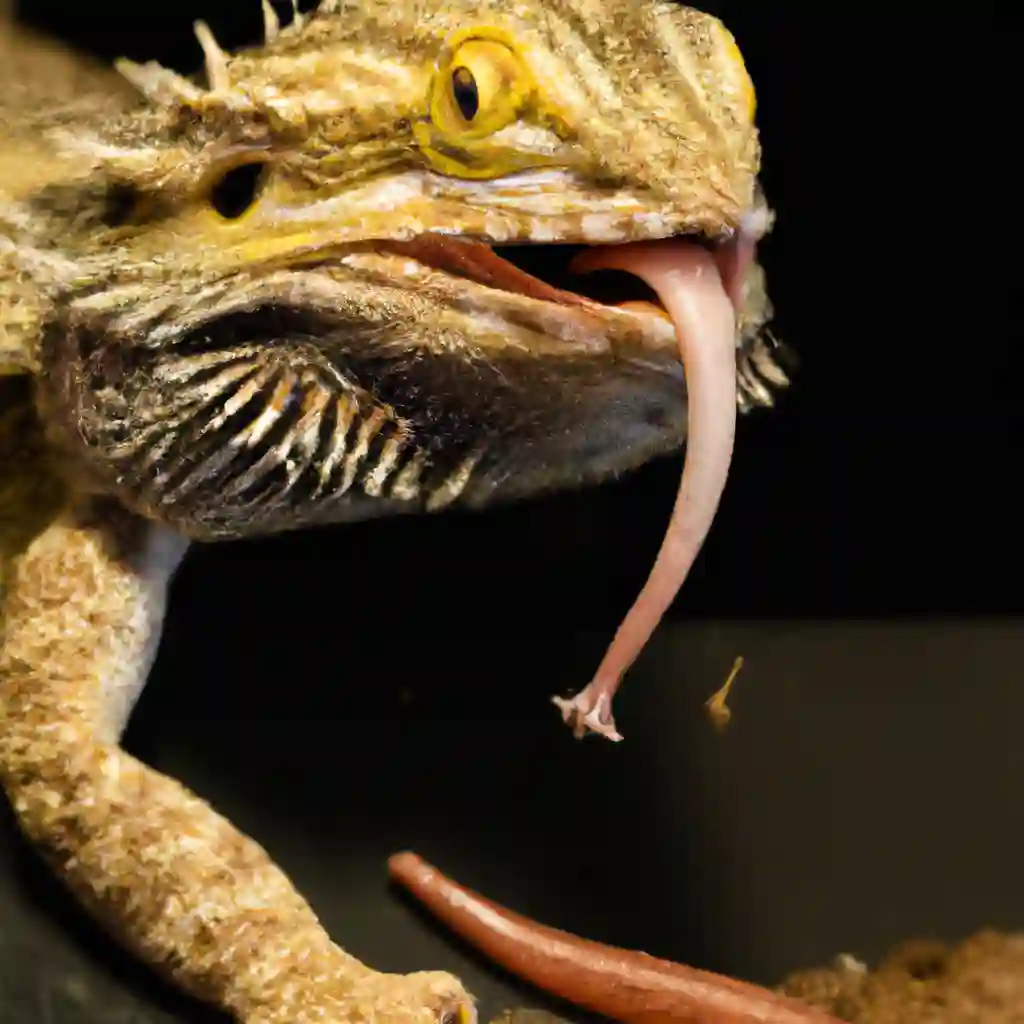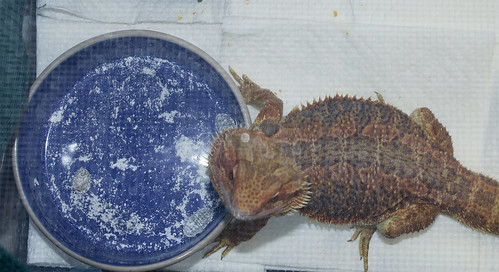Yes, bearded dragons need calcium in their diet to promote healthy growth and prevent bone disease. Calcium is one of the most important minerals for bearded dragons, and they require it to build healthy bones and maintain a strong metabolism.
This article will discuss the importance of calcium for bearded dragons and provide advice on how much calcium bearded dragons need, how to provide them with calcium, and how to identify signs of calcium deficiency.
Why Do Bearded Dragons Need Calcium?
Bearded dragons need calcium for proper growth and development, and it is essential for various physiological functions. An important source of calcium for these reptiles is their diet, which should include calcium-rich vegetables and insects.
Additionally, they can benefit from calcium supplements to ensure they are getting enough of this essential nutrient. If a bearded dragon does not get enough calcium, it could experience deficiency symptoms such as lethargy, poor appetite, and paralysis.
Therefore, it is important to ensure they are getting adequate calcium to stay healthy and happy.
Sources of Calcium
Now that we have explored the importance of calcium for bearded dragons, let’s look at the various sources of the mineral. There are a variety of calcium supplements available to provide the necessary amount of calcium for your pet.
These can be found in the form of powders, liquids, or treats. Depending on the type of calcium supplement, it can be administered to the bearded dragon in different ways.
- Powders:
- Can be sprinkled over food or added to water.
- Should be administered 2-3 times per week.
- Liquids:
- Can be mixed with water and administered with a syringe.
- Should be used in place of water on a weekly basis.
- Treats:
- Should be used sparingly as they are high in sugar.
- Should be given no more than 1-2 times per week.
In addition to calcium supplements, other sources of dietary calcium are available. These include vegetables like dandelion greens, mustard greens, turnip greens, and collard greens.
Insects like crickets, mealworms, and waxworms also provide a significant amount of calcium. Lastly, calcium-rich dusting powders can also be used to coat insects before feeding them to the bearded dragon.
Benefits of Calcium
Having a proper level of calcium in their diet is essential for the health of bearded dragons. It’s important to know the benefits of calcium and why it is so important for them. Here are some of the key benefits:
- Improved bone health and structure
- Calcium helps to ensure that the bones of bearded dragons are strong and healthy.
- It helps to protect them against soft bones, metabolic bone disease, and other conditions.
- Enhancing reproductive health
- Calcium is essential for the reproductive process of bearded dragons.
- It helps to ensure that the female bearded dragon produces healthy eggs.
Calcium also helps to improve the overall digestive health of bearded dragons and helps to ensure that their muscles and organs are functioning properly. Without enough calcium, a bearded dragon cannot be healthy and happy.
How Much Calcium Do Bearded Dragons Need?
Bearded dragons require different amounts of calcium, depending on their age. For instance, baby dragons need a higher proportion of their diet to be composed of calcium-rich foods than adult dragons.
Therefore, it is essential to understand how to calculate the calcium: phosphorus ratio in your bearded dragon’s diet to ensure they are receiving enough calcium. Additionally, diet and calcium should be balanced in order to prevent health issues down the line.
Calcium Requirements for Bearded Dragons of Different Ages
Now that we understand the importance of providing calcium to our bearded dragons, it is important to understand how much calcium each individual age group needs.
Calcium requirements for bearded dragons of different ages vary greatly, and it is important to be aware of the different calcium needs of each age group in order to provide the best nutrition for your bearded dragon.
- Baby Bearded Dragons:
- Baby bearded dragons need a diet that has a calcium to phosphorus (Ca:P) ratio that is 3:1. This ratio should be maintained for the first 6-8 months of their life.
- It is important to provide adequate calcium in their diet in order to prevent metabolic bone disease.
- Also, it is important to provide a supplement that contains vitamin D3 in order for the calcium to be properly absorbed.
- Juvenile Bearded Dragons:
- Once they reach 6-8 months of age, their calcium needs rise considerably. At this age, their diet should consist of a Ca:P ratio of 2:1.
- It is important to provide adequate calcium in their diet in order to prevent metabolic bone disease.
- Also, it is important to provide a supplement that contains vitamin D3 in order for the calcium to be properly absorbed.
- Adult Bearded Dragons:
- Once they reach adulthood, the Ca:P ratio should be 1:1, and a supplement with vitamin D3 should still be provided to ensure the calcium is absorbed properly.
- It is important to provide adequate calcium in their diet in order to prevent metabolic bone disease.
These requirements are important to keep in mind when designing a diet for your bearded dragon, as well as when calculating the calcium: phosphorus ratio in their diet.
Providing your bearded dragon with the right amount of calcium in their diet is essential for their health and well-being, so be sure to follow these guidelines for providing them with the best nutrition.
How to Calculate the Calcium: Phosphorus Ratio in Your Bearded Dragon’s Diet
When it comes to calcium requirements for bearded dragons, it’s essential to understand how to calculate the calcium: phosphorus ratio in their diet. Knowing how to do this can help you provide the right amount of calcium to your scaly friend. Here’s how to calculate the calcium: phosphorus ratio:
- First, calculate the amount of calcium in the food by multiplying its calcium content by its dry matter content.
- Next, calculate the amount of phosphorus in the food by multiplying its phosphorus content by its dry matter content.
- Finally, divide the calcium content by the phosphorus content to get the calcium: phosphorus ratio.
Using this method, you can ensure that your bearded dragon’s diet is balanced. You can also supplement your diet with calcium if needed. In addition, you should provide a variety of foods that contain calcium, as well as foods that boost vitamin D3 absorption, which helps your dragon absorb calcium more effectively.
How to Give Your Bearded Dragon Calcium
There are three main ways to give your bearded dragon the calcium it needs: dusting its food with a calcium powder, feeding them calcium-rich foods, and supplementing its diet with either calcium drops or tablets. Each of these methods has its own unique benefits and considerations.
Dusting Your Bearded Dragon’s Food with Calcium Powder
It is essential to provide your bearded dragon with the right amount of calcium in their diet. One way to make sure they are getting the calcium they need is by dusting their food with calcium powder. This can be found in most pet stores or online.
When choosing a calcium powder, make sure it is specifically for reptiles and has been tested to be safe and effective.
When dusting food, you should use a light coating of calcium powder. Be sure to follow the directions on the packaging carefully. Here is a list of items that you may want to have handy when dusting your bearded dragon’s food:
- Calcium powder
- Small bowl
- Tongs or tweezers
- Paper towels
- Small jar with lid
- Fine mesh sieve
- Baking sheet
Once you have gathered the necessary supplies, it is time to start dusting. Start by placing the appropriate amount of calcium powder in a small bowl. Then, use tongs or tweezers to pick up the food item and lightly coat it in the calcium powder.
Make sure to shake off any excess powder before placing the food item on a paper towel. It is also important to make sure that the food item is completely dry before feeding it to your bearded dragon. Once you have finished dusting, place the food item in a jar with a lid and store it in a cool, dry place.
Feeding Your Bearded Dragon Calcium-Rich Foods
Now that we understand how much calcium bearded dragons need, it’s time to discuss how to give your bearded dragon calcium. There are a few different ways to feed your bearded dragon calcium-rich foods:
- Insects: Most insects are naturally high in calcium, such as crickets, mealworms, and waxworms. When feeding your bearded dragon insects, it’s important to dust them with a calcium powder supplement to provide additional calcium.
- Fruits and Vegetables: Fruits and vegetables, such as bell peppers, kale, and collard greens, can make up a large portion of your bearded dragon’s diet. To ensure that your bearded dragon is getting enough calcium, you can sprinkle a calcium powder supplement on its food.
- Commercial Foods: If you are feeding your bearded dragon commercial food, such as a pellet-based diet, then you may not need to supplement with calcium. However, it’s still important to read the label to make sure it contains enough calcium for your bearded dragon’s needs.
Remember, it’s important to provide your bearded dragon with enough calcium in order to keep them healthy. By following the steps above, you can make sure your bearded dragon is receiving all the calcium they need.
Supplementing Your Bearded Dragon’s Diet with Calcium Drops or Tablets
In addition to dusting their food with calcium powder and providing them with calcium-rich foods, there are further steps you can take to ensure your bearded dragon is getting enough calcium. Supplementing your bearded dragon’s diet with calcium drops or tablets is an important part of their overall health.
- Calcium drops or tablets come pre-mixed with the correct ratio of calcium and vitamin D3 needed for your bearded dragon.
- Bearded dragons should be given calcium drops or tablets twice a day, every other day.
- Be sure to give your bearded dragon their drops or tablets in the morning and evening, when they are the most active.
- Calcium drops or tablets should be given to hatchlings daily.
- For adult bearded dragons, the dose should be adjusted accordingly to their size.
- It is important to read the instructions on the label of the calcium drops or tablets and follow the dosing instructions carefully.
When supplementing your bearded dragon’s diet with calcium drops or tablets, it is important to make sure they are getting the right amount. Too much calcium can cause a condition known as hypercalcemia, where the calcium levels become too high.
Signs of hypercalcemia include decreased appetite, constipation, and lethargy. If your bearded dragon is showing any signs of hypercalcemia, contact your veterinarian right away.
Conclusion
In conclusion, it is important to provide your bearded dragon with an adequate amount of calcium to ensure it stays healthy. Calcium is essential for healthy bone growth and muscle function, as well as for overall health and well-being.
As such, it is important to monitor and supplement your bearded dragon’s calcium intake to ensure it receives enough. It is important to provide your bearded dragon with a variety of calcium sources, including supplements, and to ensure they receive enough calcium to meet their needs.
With the right balance of calcium, your bearded dragon will remain healthy and happy.


